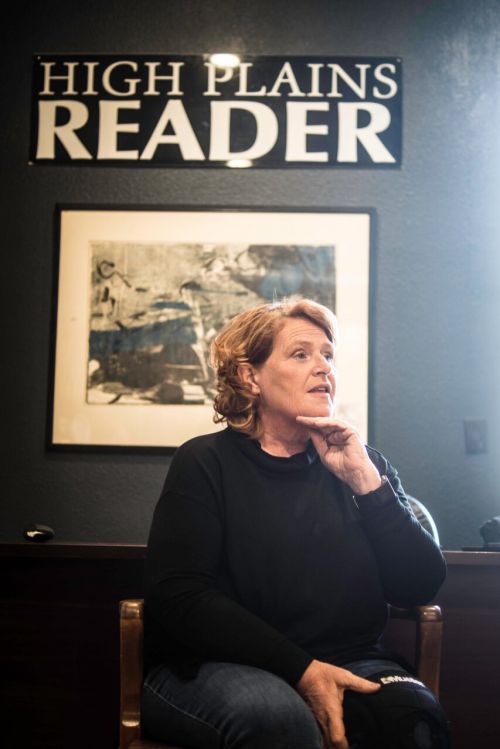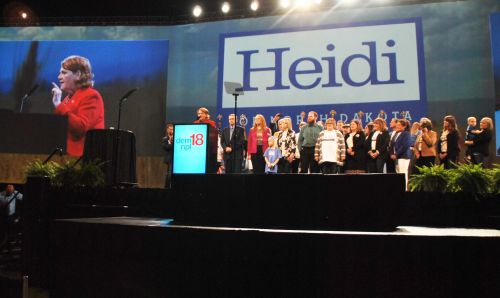News | March 19th, 2018
 GRAND FORKS - Five years of efforts working on passing Senate Bill 2155, or to roll back a part of the 2010 Dodd-Frank financial regulatory overhaul, has not won Senator Heidi Heitkamp favors among some in her own party. Senator Elizabeth Warren calls the bill the “Bank Lobbyist Act,” and she’s given multiple speeches on the Senate floor calling for Democrats to halt the bill’s passage.
GRAND FORKS - Five years of efforts working on passing Senate Bill 2155, or to roll back a part of the 2010 Dodd-Frank financial regulatory overhaul, has not won Senator Heidi Heitkamp favors among some in her own party. Senator Elizabeth Warren calls the bill the “Bank Lobbyist Act,” and she’s given multiple speeches on the Senate floor calling for Democrats to halt the bill’s passage.
Dan Rather, a journalist and former “CBS Evening News” anchor now working with “The Young Turks,” also took to the airwaves saying that Heitkamp stands to benefit personally from the bill as her family has invested up to $1 million in two banks: J.P. Morgan Chase and Berkshire Hathaway, according to a 2016 financial disclosure document.
Senate Bill 2155, or the Economic Growth, Regulatory Relief, and Consumer Protection bill, passed in the Senate on March 14, and goes next to the House of Representatives for consideration. The bill has a 64 percent chance of passing, according to analysts.
Heitkamp, a writer and sponsor of the bill, has recently come under fire by politicians and media outlets across the country, saying that she’s helping President Donald Trump dismantle the Dodd-Frank Wall Street Reform and Consumer Protection Act.
Nothing, Heitkamp said, could be further from the truth, and her family will not profit from their investments if the bill passes, she said.
“It’s a bill that I am incredibly proud of,” Heitkamp said. “I know that there have been a lot of statements made about this bill in the last week and I’m here to set a lot of those straight.
“The examples that he [Dan Rather] gives are Berkshire Hathaway, which is in fact Wells Fargo, because they have a big share of Wells Fargo, and J.P. Morgan,” Heitkamp said. “Neither one of those institutions will benefit from 2155.
“Dan Rather is wrong, and anyone who says otherwise is wrong.”
Work started on Senate Bill 2155 in 2013, and it primarily addresses the concerns of banks in rural communities, including access to capital concerns, and relaxation of regulatory restrictions to make small banks competitive against larger banks. The bill amends the Truth in Lending Act to allow institutions with less than $10 billion in assets to waive ability-to-repay requirements for certain residential-mortgage loans. Other mortgage-lending provisions related to appraisals, mortgage data, employment of loan originators, manufactured homes, and transaction waiting periods are also modified.
The bill also amends the Bank Holding Company Act of 1956, which exempted banks with assets valued at less than $10 billion from the "Volcker Rule," a law that prohibited banking agencies from engaging in proprietary trading or entering into certain relationships with hedge funds and private-equity funds.
“The institutions that we gave the relief to were first and foremost small community banks, and the credit unions, and then the regional banks, those banks that have assets below $250 billion,” Heitkamp said. “Wells and J.P. Morgan are well above 250. So there are no substantial measures in there at all for the banks he is highlighting.”
Using layman’s terms, the bill also requires credit reporting agencies to provide credit-freeze alerts and includes consumer-credit provisions related to senior citizens, minors, and veterans. The bill amends the United States Housing Act of 1937 to reduce inspection requirements and environmental-review requirements for certain smaller, rural public-housing agencies.
Some of the statements against Senate Bill 2155 she considers reckless.
“This is not a give-a-way to Wall Street,” Heitkamp said on the Senate floor.
The bill leaves in place laws that hold Wall Street accountable, and it does not give larger banks leeway that could wreak havoc on the American economy, Heitkamp said. The bill will not lead to another mortgage lending crisis, which in 2008, was spurred by “liar loans.”

Thirty years ago, the United States had 14,000 banks, Heitkamp said. Since Dodd-Frank banks have dwindled to approximately 5,000.
“This is an attempt to write a bill that would give direction to the federal regulators, so that small banks could be treated as small banks, and large banks could continue to be regulated and treated as the large systemically significant institutions that they are,” Heitkamp said.
“The big banks have gotten bigger since the passage of Dodd Frank, and the small banks have disappeared, and they have retreated from their traditional role of relationship lending, first out of fear from regulation and that they might be doing something wrong, and then out of fear of the cost of regulation if they’re going to work toward compliance.”
She wants to give small banks a hand up, she said.
“In fact, one of the reasons why I did it was to give those banks competition. If we can make the community banks healthier we can get more competition for Berkshire and for Wells Fargo or J.P. Morgan,” Heitkamp said.
“I want to make one simple point: this bill was not written for Wall Street bankers, it was not written by Wall Street lobbyists, if it were, it would be a completely different bill… It is absolutely essential that we set the record straight.”
Over the weekend during the 2018 Democratic-NPL Convention at the Alerus Center in Grand Forks, former Vice President Joe Biden, who spoke at the convention, former senators Byron Dorgan and Kent Conrad, former Congressman Earl Pomeroy, and the North Dakota Democratic-NPL, endorsed Heitkamp.
Critics say she works too much across the political aisle, but Heitkamp disagrees.
“I do what it takes to get things done for the state of North Dakota,” Heitkamp said. “The proof is in the pudding I think, we’ve had tremendous results. I am going to work with whoever will work with me to get results for North Dakota.”
The race between Heitkamp and her reputed opponent, current Congressman Kevin Cramer, a Republican, promises to be intriguing, and has already attracted national attention.
“I think the choice that North Dakota will have is ‘Are you going to hire someone to be your Senator who knows how to work across the political aisle, or somebody who is only going to represent one political party?’” Heitkamp said. “And that’s the Republicans. That is the choice North Dakota will have.”
“Cramer has no accomplishments that I can see,” Dorgan said during a speech at the Democratic convention. Quoting former British Prime Minister Sir Winston Churchill, Dorgan said Cramer is “The thin soup from boiling the shadow of a pigeon that has been starved to death.”
“I expect him to play hard,” Heitkamp said. “And there will be discussions. What I certainly hope is that we can leave personal stuff out, and we can talk about who has gotten results for North Dakota.”
“To me, I look at these campaigns as job interviews,” Heitkamp said. “And so the first thing you are going to ask someone is: ‘Why do you want the job?’ second question, ‘What have you don’t that would recommend you to a second term?’ And I think we have a great story to tell, we’ve got a great record to talk about, and so we’re anxious to get on the ground and do it.”
February 16th 2026
January 27th 2026
January 27th 2026
January 26th 2026
January 24th 2026
_(1)_(1)_(1)_(1)_(1)__293px-wide.jpg)

_(1)_(1)_(1)_(1)_(1)__293px-wide.jpg)


__293px-wide.jpg)